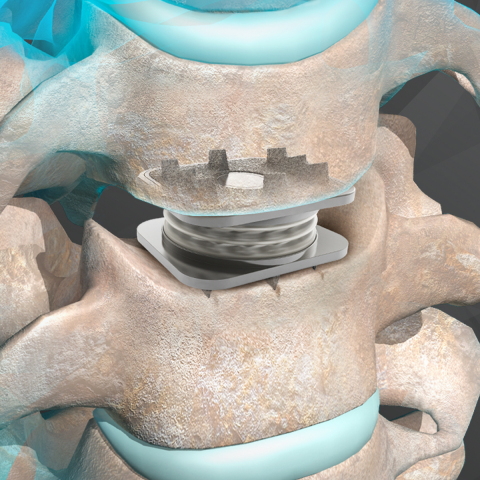LEWISVILLE, Texas– Orthofix Medical Inc. (NASDAQ:OFIX), a leading global spine and orthopedics company, today announced the publication of the five-year results from the U.S. clinical study comparing the M6-C™ artificial cervical disc with anterior cervical discectomy and fusion (ACDF). Published in The Spine Journal, patients treated with the M6-C disc demonstrated superior clinical success at 60 months compared to ACDF patients. Secondary findings indicated significant improvements in neck and arm pain, function, and quality of life scores. The M6-C patient group maintained the flexion-extension and lateral bending motion reported at earlier time points. The publication of this data coincides with the recognition that more than 100,000 implantations of the M6-C artificial cervical disc and the M6-L artificial lumbar disc (only available outside the U.S.) have been performed worldwide since the product’s first introduction in 2006.
“Publication of this data is important as it validates the strong clinical performance observed in the five-year data from the U.S. IDE study,” said lead author Dr. Frank Phillips, Professor of Orthopedic Surgery at Rush University Medical Center in Chicago and the Principal Investigator for the FDA clinical trial. “Artificial cervical disc replacement is becoming the gold standard of care for indicated patients who may otherwise be facing cervical disc fusion. Data from this study show that the M6-C artificial disc demonstrated superior five-year achievement of clinical success when compared to ACDF controls. In addition, significantly more subjects in the M6-C group reported improved pain and physical functioning scores than observed in ACDF subjects, with no difference in re-operation rates or safety outcomes.”
A prospective, non-randomized, concurrently controlled clinical trial, the M6-C IDE study was conducted at 23 sites in the United States with an average patient age of 44 years. The study evaluated the safety and effectiveness of the M6-C artificial cervical disc compared to ACDF for the treatment of single-level symptomatic cervical radiculopathy with or without cord compression. The overall success rate for the protocol-specified primary endpoint for the M6-C disc patients was 82.3 percent as compared to 67.0 percent in the control group. The rates of M6-C disc subsequent surgical interventions (SSI) were 3.1 percent, device or procedure-related serious adverse events (SAE) were 3.1 percent and were similar to ACDF rates of SSI at 5.3 percent and SAE failure equaling 4.8 percent. The M6-C disc received U.S. Food and Drug Administration (FDA) approval in February 2019 based on the two-year results of this study.
“To date there have been more than 100,000 implantations of M6 artificial disc technology in 20 countries around the world,” said Kevin Kenny, President, Orthofix Global Spine. “We are proud of this life-changing technology that has helped so many people get back to enjoying their lives.”


